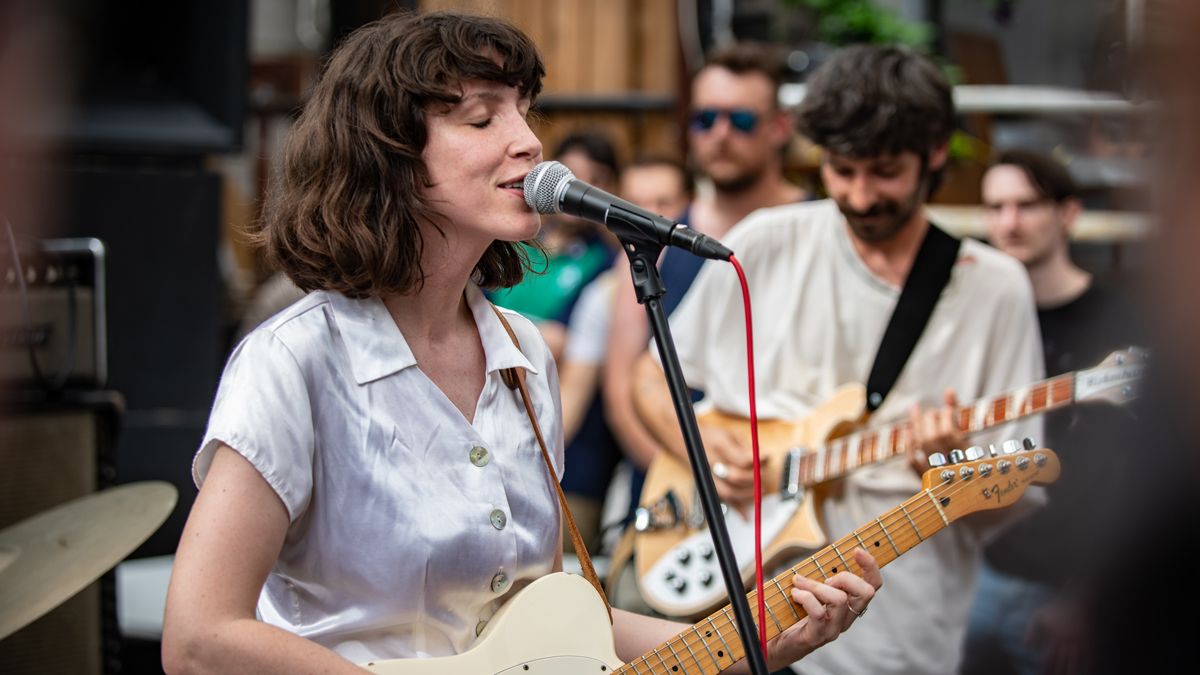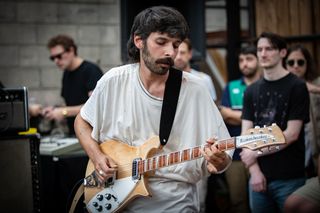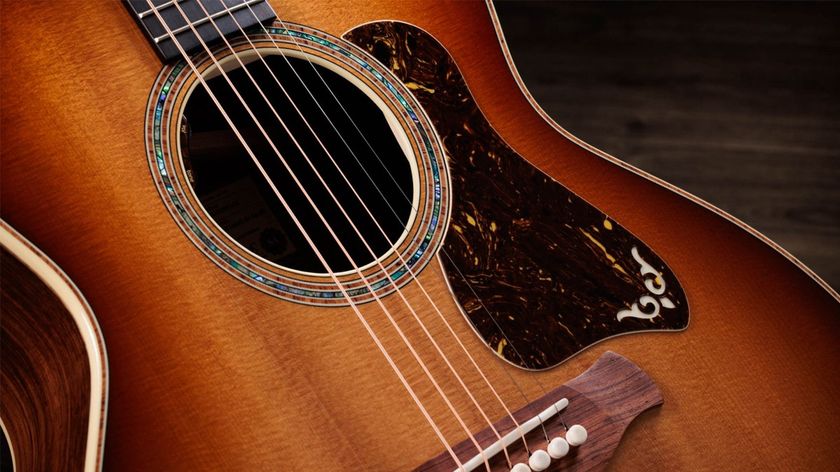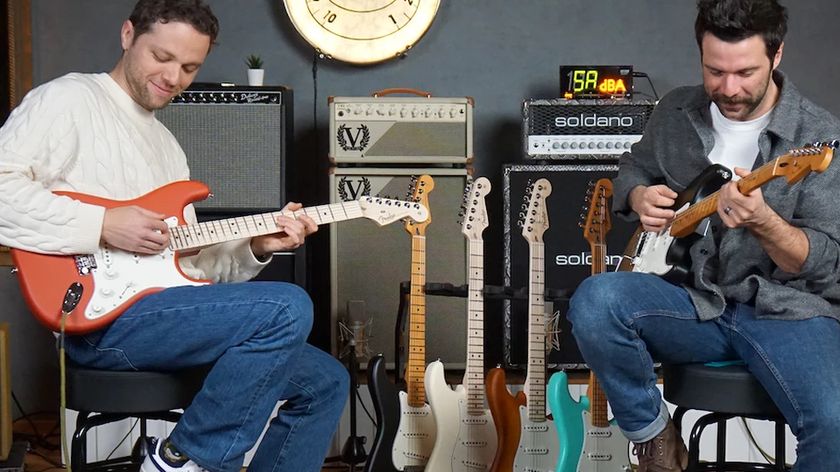Widowspeak: “In every little lick, you can hear the millions of things you’ve heard before. At a certain point, you develop your own way of doing that”
Molly Hamilton and Robert Earl Thomas discuss their woozily brilliant new ‘guitar record’, The Jacket

On Widowspeak’s sixth album, The Jacket, the New York-based duo have both gone back to basics as a guitar band and somehow made their most original and complete record yet.
The Jacket is a concept record that doesn’t worry too much about sticking to the concept. Mostly, it documents the life of a garment-maker in the Southwest who joins an art-rock band and charts the interacting, sometimes opposing, forces found at the interception of the real and creative worlds. But sometimes it doesn’t.
Ultimately, The Jacket is a slice of life and an escape from it in equal measure. It is so laid back you have to listen to it sitting down, but also breezy, in-the-pocket and full of addictive little guitar breaks. It rattles along its own path, referencing everything from The Velvet Underground to Pavement and beyond on the way.
It was born when the band’s central pair of Molly Hamilton and Robert Earl Thomas moved back to the city, following a period in upstate New York. That era gave birth to The Jacket’s predecessor, 2020’s Plum – a studio-focused album, laced with synthesizers and artificial elements – right in time for the pandemic.
Left unable to tour and newly surrounded by the hum of the city and their fellow musicians (including original drummer, Michael Stasiak, and J.D. Sumner on bass), a desire for something live took hold – and it is stitched into the lining of The Jacket.
“We wanted to make a band record,” summarizes Thomas. “A rock record. A guitar record, or at least our version of that…”
This is your sixth album. How have you come to view the guitar’s role in your music at this point? What’s its purpose on The Jacket?
Get The Pick Newsletter
All the latest guitar news, interviews, lessons, reviews, deals and more, direct to your inbox!
Hamilton: “I pretty much only write songs on guitar. It’s usually just basic chords and some fingerpicking patterns, like in Everything Is Simple. But I think, also, on this record, we very consciously created more of that space, where I’m singing a passage, and then it kind of drops out. And then Rob’s guitar kind of fills in that space – sort of in conversation with each other.
“On our other records, we’d focus more on a wall of sound or having these more densely produced tracks. This one, it was more about holding back and letting them kind of work together.”
Thomas: “I agree. I think it’s like duets in that way. If you think about it, the band is you and me, and I don’t sing in Widowspeak. So the guitar is my voice. So in the simplest sense, Molly singing, and me playing the guitar is the big foundation of our band.
Solos can say different things and have different personalities, but when you’ve done 100 takes of them, it starts to blur together. So having less of them, it just makes your decisions more clear
Molly Hamilton
“In some ways, it’s like getting back to being really basic about that. But we’re both 10 years into doing this. So I think that we have a little bit more aplomb that when we started, a little bit more dexterity, and understanding of each other. It’s like, ‘We are a guitar band. We are not anything else,’ you know? We can be more but that is what’s there to start off.”
Back in 2015, you told Performer mag that you estimated there were something like 1,000 guitar takes, 1,000 vocal takes recorded for your album All Yours. It seems like that’s not been the case this time.
Thomas: “No! Not at all. You get less precious and also you give into the moment. We probably did three takes of The Jacket: two of them were fast and one of them was the way it turned out. And we were like, ‘That’s pretty much it.’’’
What are you looking for in those moments? What has experience taught you?
Thomas: “It sounds so silly, but it’s gut. You just know immediately when it’s good.”
Hamilton: “Sometimes you don’t even notice in the moment, though. It’s something you figure out later on, when you’ve got tapes for the day…”
Thomas: “Yeah, that’s true. Like, the last song on the record Sleeper, we had the basic track but all those guitar leads are an overdub. I spent half a day doing it and was like, ‘It’s trash!’ I was about to can the song and Molly was like, ‘No, you did a good pass…’ And we went back and the very first pass I did was all of those guitar licks, in one! But I had [missed it] and spent another half a day on it.”
If you’re trying to redo something that is 90 percent good to fix the 10 percent, you’re probably gonna fail. So it’s better just to find something else to help with that 10 percent. So leave mistakes in. I left a bunch of dead notes on the record!
Robert Earl Thomas
Hamilton: “That’s when I think that having another set of ears there is so helpful, because, you know, I hadn’t been emotionally involved in the guitar passes he had been doing, but I definitely remembered my reaction to that first pass.
“Solos can say different things and have different personalities, but when you’ve done 100 takes of them, it starts to blur together. So having less of them, it just makes your decisions more clear.
“In the early days, we were seeking perfection and it would end up becoming a chaotic mixing process. You’re choosing between all of these abstractly different takes that are, ultimately, the same.”
Thomas: “I also think that what I’ve learned is when there’s a take that’s really good, and there’s a mistake in it, instead of trying to retake it, just do something clever to take care of the mistake. Either cut it out or put something else in or like just come up with some other fix.
“If you’re trying to redo something that is 90 percent good to fix the 10 percent, you’re probably gonna fail. So it’s better just to find something else to help with that 10 percent. So leave mistakes in. I left a bunch of dead notes on the record!”

What have you noticed about how each other’s playing has changed or evolved across six albums?
Hamilton: “I think that I’ve kind of dug in deeper, to the point where I understand what it is we do well together. Rob’s kind of developed his own way of playing that I think is really apparent. I feel like it’s very defined, which I think has been cool to see over 12 years of being a band.
“At the very beginning, you’re inspired by a lot of other players and bands but then, eventually, you start to see where the through line is and what it is that you’re doing that’s unique. So that’s become clearer to me.”
Thomas: “I think you have your specific chord voicings, Molly, and I think you’ve wrapped them in your style of singing to the point where they’re kind of inseparable. Your voicing drives the whole band, even if it’s not like a ‘pay attention to this!’ thing. Without it, something’s definitely missing.
I actually just told my friend that I think that I’ve been playing guitar for like 20 years, and I’ve only recently decided that I’m a guitar player
Robert Earl Thomas
“I actually just told my friend that I think that I’ve been playing guitar for like 20 years, and I’ve only recently decided that I’m a guitar player. I think that has to do with a competence in the way that I’m playing now.
“I think this goes into what you’re saying about knowing good takes and stuff. I don’t try to be clever. I play things that I think sometimes are straightforward, and maybe the obvious choice but I’m at this point where I trust that my spirit will come through in them.”
Hamilton: “Yeah, so much of the sound now is making references to things, and I do think there’s something about understanding when simple is good. A lot of what we do in the songwriting/demo process, even before we get into the studio, is figuring out where there’s too much going on and pulling it back to something more central. You can always play it differently, live and on tour.
“We’ve not stopped being ambitious with songs, but I think this record was a way of circling back to what is most essential about how we play together.”
You mentioned that idea of just referencing things in your writing and sound. Can you expand on what you mean by that?
Hamilton: “I mean every little lick that is played, you can almost hear all the millions of things you’ve heard before [feeding into it]. At a certain point, you do develop your own way of doing that, and that is your own sound. Whatever you’re inspired by, that’s gonna come through in the way that you play, just because that’s what you hear.
“With what Rob comes up with, if he’s listening to a lot of country, he’ll have a more Bakersfield type of sound. But then, other times, we’re just at home listening to a lot of Pavement then that more angular kind of thing will come through.”
Thomas: “I think we’re more folklorists than futurists. So we play into those things [that we love]. When we approach music, we’re making it in communication and conversation with things in the past that we like, as opposed to trying to like...”
Hamilton: “Burn it all down!”
Thomas: “Yeah, you know, some people do great work in that vein – it’s just for us, I think that’s not where we live.”
It’s hard to sustain great work like that, it seems. The destructive spirit absolutely has a place, but it doesn’t work longterm as a musician. Those artists rarely make several great albums...
Thomas: “Yeah. They make one really cool record and disappear.”
That idea of referencing in playing is really interesting. That you don’t have to spell out the whole idea – you can allude to something you love without actually having to repeat it verbatim. You can recontextualize it.
Thomas: “Yeah, I think one effect, you know, says a lot.”

So, on that front, what was your go-to gear for this album?
Thomas: “Right after we finished Plum, I finally bought myself a nice guitar. I’ve been playing Mexican Fender guitars forever, which I love, but I got a Rickenbacker, a 620, one of the solid-bodied models, which I really like. It’s a really great guitar. And it’s cool because it’s not just one of those jangly 12-strings. It’s got a lot of cool tone options. You can move between the two pickups, using this blend knob, so you can get a lot of variety of sound.
“I’m from Chicago, and we were visiting my family and there’s a big store there called the Chicago Music Exchange. I was going to get a nicer Fender guitar, but Molly was like, ‘Go look at the wall of Rickenbackers. Just humor me...’ [laughs] And so I checked it out and I played it and it was nice, because they had a couple different versions of the model I liked.”
I’ve whittled down the pedals I use to the point where I like basically don’t use any anymore. It’s really just like trying to dial in my amp sound and then using the Telecaster. It just feels like an extension of me at this point
Molly Hamilton
Hamilton: “Yours was like ’90s. But it was funny, just even seeing like the tonal difference between like the late-’80s and early-’90s.”
Thomas: “The neck feel, too, on some ones that were made a couple years apart [was very different]. So I did most of the record with that. And I played through one of those Ampeg combos from the ’70s for most of it and then Molly used her Supro – a new Supro that’s our touring amp.
“Then for some of the overdub stuff that’s a little more unhinged, they had a hollowbody from the ’60s and you could get a lot of buzz and feedback out of it. I don’t know exactly what it was – Diamond Mine [studio] has all this vintage gear. There was also this really cool, old Magnatone amp. A little cardboard speaker – it was really cool. But those are pretty much what’s on the record.”
Hamilton: “And I still play a Mexican Tele, which I’ve been playing since the first record. It just feels right. I really just play chords while singing, so much of it is feeling comfortable and very at ease so that I can do two things at once.
“I’ve tried switching up my setup, and over the years, I’ve whittled down the pedals I use to the point where I like basically don’t use any anymore. It’s really just like trying to dial in my amp sound and then using the Telecaster. It just feels like an extension of me at this point. It just is my guitar. And it’s lasted this long. I keep getting it set up, but it’s in good shape!”
Thomas: “The cool thing about your guitar is you have had it so long that everyone thinks it’s like some crazy old vintage guitar.”
Hamilton: “It’s knocked up!”
Thomas: “The color is worn and it’s been toured for so long and people are like, ‘Is that like a ’60s guitar!?’”

What are your favorite guitar moments on The Jacket? What stands out for you?
Hamilton: “I really love the solo in True Blue because it was one of the first tracks we recorded. And it I think just like the looseness of it and the way it was kind of meandering, it felt like you were in a room watching a band play. Some of that is the sonics of the actual recording, but I just felt like Rob touched on something that was loose and present, and that really dictated the way the rest of the record ended up sounding.”
Thomas: “We were recording that to tape and no-one was paying attention, and right at the end of that solo, the tape ran out. So we got the solo in just in time!”
Hamilton: “There’s a hard stop, anyway. So it did that and then the tape ran out.”
Everything Is Simple doesn’t have any guitar pyrotechnics but I just think that it’s one of the best performances we’ve ever put to tape
Robert Earl Thomas
Thomas: “My favorite guitar moment… I like Everything Is Simple. I think it’s really cool the way the band is like breathing. It doesn’t have any guitar pyrotechnics but I just think that it’s one of the best performances we’ve ever put to tape, as an actual performance. So I’m really happy with that. And I think that The Jacket playing, I’m really proud of those parts. I love the ringing guitar chord. It’s almost so stupid that it’s amazing!”
Finally, your previous record, Plum, dealt very directly with the realities of creative life and the trade-offs involved. The Jacket is a continuation of those themes, albeit in a narrative form. How do you feel about life as a musician in 2022?
Hamilton: “I think I’ve become more pragmatic, and also more optimistic about it. I understand how music is both commodified and almost ignored. It is treated as something that is both constant, but also valueless by some of the infrastructures of the music industry today. But at the same time, from a personal perspective, I believe more and more in what I love about doing it and what I am getting out of continuing to make records, despite the difficulties.
“I’m not really doing this anymore because of the drive of like, ‘What could be possible in being in a rock and roll band’, because I don’t think you have control over where that can go as a career. But I’m really proud of coming this far, and I think that’s where the value is: just being able to hopefully be sustained by making records and knowing that things are going to change in the music industry – because they always will change. But regardless of all that, you just have to be excited about your own music and hope that it reaches some ears, you know?”
Thomas: “I’m pretty much in the same place. I’m wholly disillusioned with the music industry. But I’ve also not been more excited or taken more joy from making music since I was a teenager. And so we’re lucky that we get to keep making records. My disillusionment – I wouldn’t say it’s pessimism – but like Molly, I’m not holding out on some kind of weird dream anymore, which is maybe what I was doing as a younger person. Now I’m just enjoying the fact that I get to do it – and I feel lucky that I get to keep doing it.”

Matt is Features Editor for GuitarWorld.com. Before that he spent 10 years as a freelance music journalist, interviewing artists for the likes of Total Guitar, Guitarist, Guitar World, MusicRadar, NME.com, DJ Mag and Electronic Sound. In 2020, he launched CreativeMoney.co.uk, which aims to share the ideas that make creative lifestyles more sustainable. He plays guitar, but should not be allowed near your delay pedals.

“An investment-grade, pro-quality guitar that will provide decades of playing enjoyment before it becomes a treasured family heirloom”: Taylor Gold Label 814e SB review

“Satin Stratocaster dreams”: Fender and Thomann have produced two new exclusive Stratocaster lines – and their prices rival existing US and Mexico-made models









